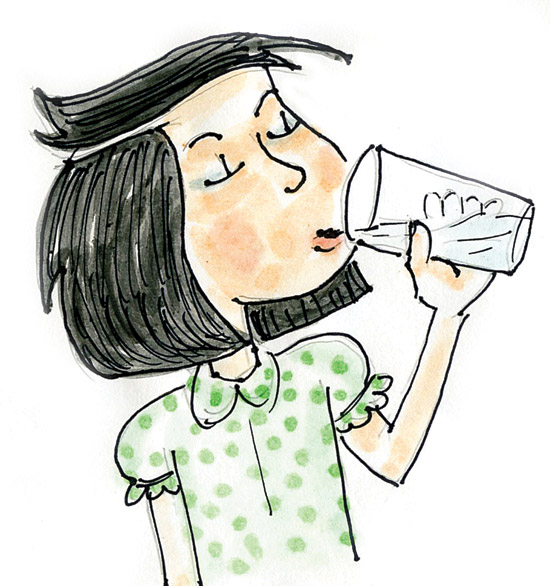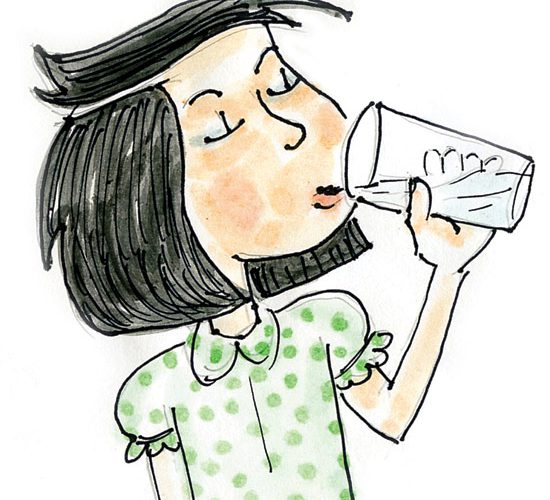(No.8, Vol.2, August 2012 Vietnam Heritage Magazine)
In the early 1950s in my house, as well as in every other family’s in Hanoi, there used to be a few glass bottles of boiled water. The boiled water was the water that had been taken from the faucet and boiled up to a very high temperature.
Then, people in Hanoi primarily cooked food using firewood. The gas stove has been used only recently. The faucet water needs to be boiled up to a very high temperature. My grandmother said if we drank the water that was boiled to a not-high-enough temperature, we could have difficulties in urinating. When we boiled water, we had to be very careful or the water could smell of smoke – a very unpleasant burnt smell.

Cartoon: Duc Lai
The bottles that contained the boiled water were usually the glass bottles that had used to contain wine. Every now and then we had to clean the bottles by dropping in some tiny pebbles together with some pieces of soap sliced from a square bar of soap with ‘72 per cent oil’ printed in relief on it. At that time, the Hanoians didn’t have washing powder, nor did they have any hand-washing solutions. Bottles that had been used to contain fish sauce or kerosene would never be used to contain boiled water.
After the faucet water had been boiled up and cooled down, my grandmother or my sister placed a piece of clean cotton on a piece of gauze, then put them on the mouth of an aluminum funnel which was used only to filter the water, not to be used for anything else like alcohol or fish sauce. She would put the funnel into the neck of a clean bottle, then pour the boiled water into each bottle, waiting patiently for each to be filled up.
The top part of each bottle was covered with a lid made from paper from a student’s notebook, which had the form of a conical hat, for dust-proofing. The bottles of boiled water in my house were always arranged neatly on a small wardrobe within the reach of the children. Next to them was a clean glass placed upside down on a china plate. When we got home from school or after we had played running around sweating all over or when my father got home from work, we poured the water out with care into a small cup before we drank it. We just poured out enough for a small gulp, not too much or else we would have to throw some away. Who dared to waste the water to which my grandmother or my sister had devoted her time whole-heartedly, preparing with care?
The way we drank the boiled water is most democratic in my family. From my grandparents, my parents to my brothers and sisters and me, everybody had the equal right to drink it, no matter what position he or she was in, the superior or inferior one. Later when we have grown up, we all take turns to prepare the boiled water for the whole family. It is a taboo in my family to hold the whole bottle to drink swillingly and directly from the bottle.
Nowadays, many families have given up drinking the boiled water this way. People drink the purified water from different kinds of plastic bottles. Some families drink water from the water-purifier. Most families in Hanoi have a refrigerator where they keep bottles of cool water reserved for the children as well as the adults. Many people have given up the habit of drinking boiled water; they drink tea, soft drinks or fizzy refreshment drinks. I still keep the old habit of drinking the boiled water and I drink a lot, but today the refrigerator has gradually made me forget the old popular habit. Now, I even feel uncomfortable drinking water that is not cold enough.
Sometimes, in the meeting hall, there are representatives who don’t feel ruffled holding a gigantic bottle drinking swillingly in front of many people although they are sitting in the chairs reserved for the board and in front of them is a line of crystal-clear glasses. It is a habit of the foreigners to empty a glass of water at a gulp. When we go and work on the field, we drink our own water, not the other people’s. But in the meeting room, should we keep that kind of habit?
If my grandmother were still alive and saw me gulping that way, I would be very harshly scolded. Certainly she would say, ‘There is not any Hanoian who drinks that way.’

